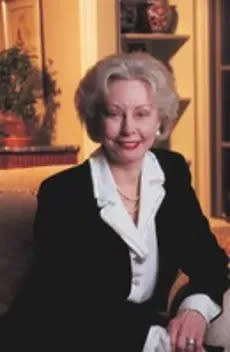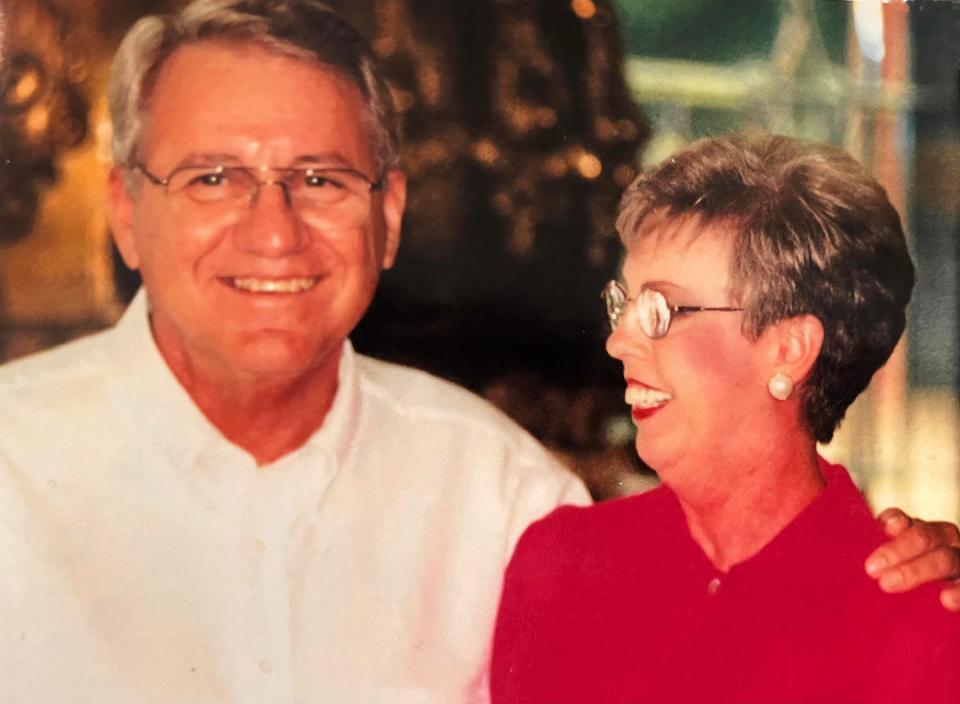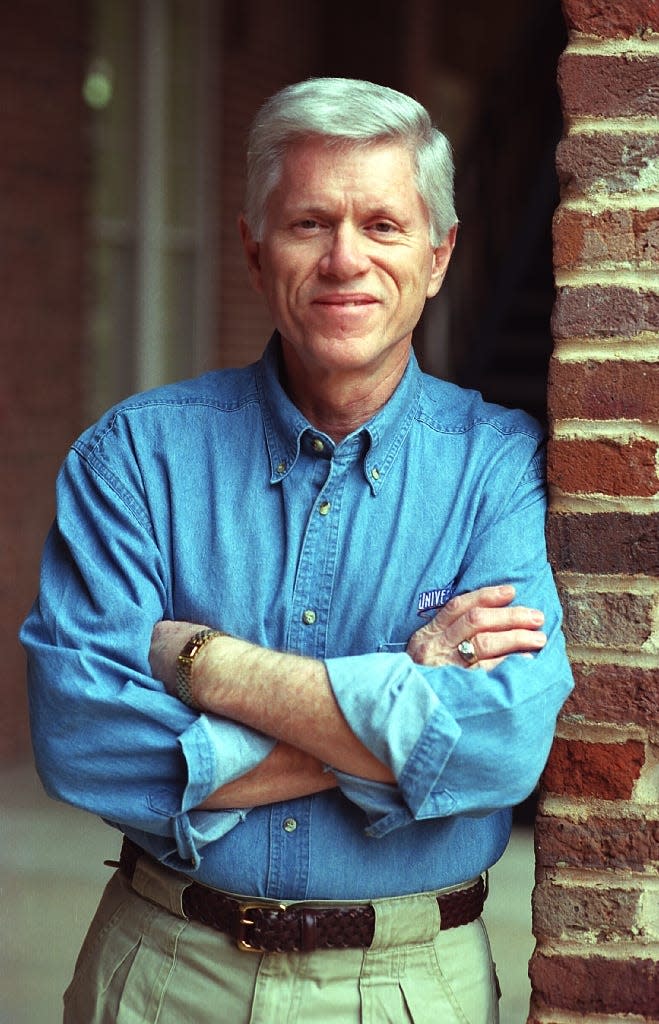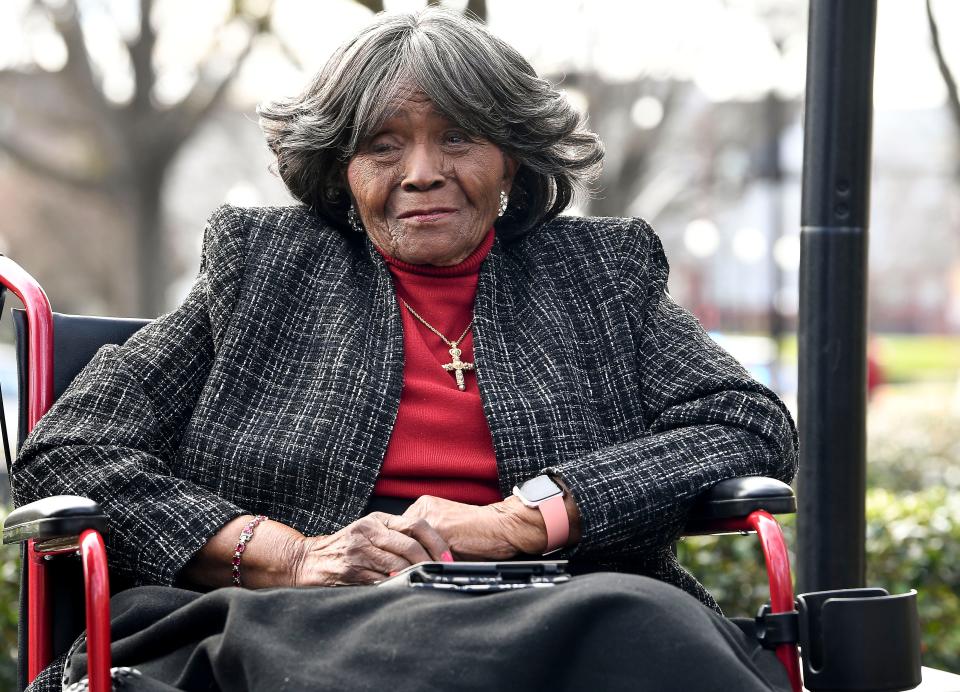Eight notable Tuscaloosa people who died in 2022
- Oops!Something went wrong.Please try again later.
- Oops!Something went wrong.Please try again later.
A civil rights pioneer, a longtime columnist for The Tuscaloosa News and a legendary musician in the T-town bar scene were among the notable obituaries in 2022.
Here's a look back at eight people who died in 2022 and how they had an impact on the Tuscaloosa community:
Gloria Narramore Moody

Gloria Narramore Moody, a "steel magnolia" whose personal and philanthropic support kept arts organizations healthy and thriving in Tuscaloosa and throughout Alabama, died July 24 of natural causes at 88.
Through her Gloria Narramore Moody Foundation, and with the support of late husband Frank Moody, she drove creation of the University of Alabama School of Music's 135,000 square-foot Frank M. Moody Building; its piano area is named the Gloria Narramore Moody Piano Wing.
She served as chairwoman of the board for the Tuscaloosa Symphony Orchestra for from 1992 to 1998, a function she also served for the Alabama Symphony Orchestra. She held similar leadership positions with groups including the Alabama State Council of the Arts, the Alabama Shakespeare Festival, NPR's "From the Top," Red Mountain Theatre, the Alys Stephens Performing Arts Center, the Birmingham Museum of Art, the UA President’s Advisory Board and the UA President’s Cabinet.
"There's no question in her case: She made the world a better place to live for her being in it," said Charles "Skip" Snead, director of the University of Alabama School of Music.
Charlie Wilson

Tuscaloosa entrepreneur, philanthropist and arts supporter Charlie Wilson died May 31 at the age of 91.
A man of varied interests, Wilson edited the college newspaper during his days at the University of Alabama, founded a Tuscaloosa church, ran for the Alabama Legislature and collected art in Paris.
As an ardent entrepreneur, Wilson created and ran numerous businesses through his working life, which continued until he was almost 90. Under Monticello and later Metro Investing, he had owned cemeteries, apartment complexes, shopping centers and more, winning awards from the National Board of Realtors. At times he worked in insurance, and owned a garbage-pickup company. The Tuscaloosa Chamber of Commerce gave Wilson its first Member of the Year award in 1964.
In the late '50s, Wilson teamed with attorney Jack Evans to create The Racquet Club, a social club with grass and green clay tennis courts, swimming pools, a clubhouse and snack bar, on land across 15th Street East from what's now University Mall.
He fathered, as he famously told a New York Daily News journalist, "six only children," each driven and passionate in their varying fields.
Evan Wilson, his second-oldest son, said "We had a real interesting mix of things that my father was attracted to. I don't think we thought of ourselves as an artistic family; it was just part of our natural surroundings. ... Daddy instilled in each one of his children, regardless of their chosen field, a passion and determination for excellence and success.".
Tommy Stevenson

Veteran journalist Tommy Stevenson, an editor and columnist for the Tuscaloosa News for more than 40 years, died April 11 at the age of 73.
After graduating from Birmingham-Southern College, Stevenson started his journalism career at the Birmingham Post-Herald and then moved to the Decatur Daily. Stevenson joined The Tuscaloosa News in 1976 and retired as its associate editor in 2012, but he remained on as a recurring columnist until his death.
He served for a short time as the first press secretary for Richard Shelby, the former city of Tuscaloosa prosecutor who was first elected to the U.S. House in 1978 before moving to the U.S. Senate for 36 years.
Stevenson's stint with Shelby lasted about six months said his brother, Paul Stevenson, who was second of three Stevenson boys born and raised in Scottsboro, sons of a Methodist preacher father. Tommy was the eldest, Paul the middle, and Mark Stevenson the youngest. "There wasn't much need for a press secretary, for a freshman representative," Paul Stevenson said.
After leaving D.C., Stevenson returned to The Tuscaloosa News. As a political reporter, columnist, editorial writer and blogger, Stevenson was known for his Panama hats, blazing Hawaiian aloha shirts, cigars, long hair and his full bushy beard.
"Tommy was well known and well-received in Montgomery's and Washington's halls of power," said longtime colleague Robert DeWitt. "Governors, senators, congressmen legislators and aspirants to those offices frequently sought him out. When they wanted to make an important public announcement, he was often the first one they called."
Ed Watkins
![Ed Watkins began working at The Tuscaloosa News in 1947 and retired in 2000 after covering sports and news throughout the West Alabama region. [Staff file photo]](https://s.yimg.com/ny/api/res/1.2/S5Ce2wOmn.EgaerE9.qJDQ--/YXBwaWQ9aGlnaGxhbmRlcjt3PTk2MDtoPTcwMQ--/https://media.zenfs.com/en/the-tuscaloosa-news/f510378c674f9dceb4ddc471f16d4700)
Ed Watkins, who covered sports and news for The Tuscaloosa News for more than 50 years, died March 9 at the age of 94.
Watkins began his career in 1947 writing sports, paid pennies per word to handle 24 phoned-in high-school football games each week, working up to sports editor, where he was crucial in hiring Charles Land, who later became publisher of The Tuscaloosa News.
Watkins moved to the news side in 1955, to cut down on travel and spend more time with family, including wife Betty Jo, daughter Lisa and son Gary.
More:Ed Watkins, a 53-year Tuscaloosa News veteran, was all about family
Over the next 45 years, he developed those extensive contacts throughout West Alabama, talking to everyone from working folks to high officials, interviewing celebrities including George Wallace, Ted Kennedy, Billy Graham, Dale Evans, Teddy Pendergrass, the band Alabama, and Tuscaloosa pianist Jack Marshall, who played with The Blackwood Brothers and became close friends with Elvis Presley.
He won numerous accolades, including Associated Press news writing awards, am Agricultural Communications Award for 1975, Alabama Forest Festival Committee’s Daily Newspaper Communicator of the Year Award, and others. In 1997, then-Tuscaloosa Mayor Al DuPont declared March 3 "Ed Watkins Day."
Watkins retired in 2000.
"In my estimation, no writer who worked at The Tuscaloosa News served Alabama like Ed Watkins," said longtime colleague Jerry Carpenter.
D.C. Moon
![D.C. Moon and His Atomic Supermen perform at the Chukker in Tuscaloosa in this 2003 file photo. [Staff file photo]](https://s.yimg.com/ny/api/res/1.2/xrfbjlJT7E7i5B5_oTFOhQ--/YXBwaWQ9aGlnaGxhbmRlcjt3PTk2MDtoPTExNzE-/https://media.zenfs.com/en/the-tuscaloosa-news/4f54ab49dd98f647b506afa0841d795d)
D.C. Moon, a major part of the Tuscaloosa music scene for decades, died in early February at the age of 62.
Moon, born David Craig Williams, performed at places like the Chukker and Egan's Bar with a number of bands, including Burning Zoo, D.C. Moon and His Atomic Supermen, Mary Tylosaur, Red Giant and Monster Island.
His original songs had such titles as "The Communists, the Martians and the C.I.A.," "Firehogs!," "The Meteor Titanic," "Goin' to a Hurricane Slam Dance Party," "Vasquez Rocks," "Screaming at the Edge" and "When California Falls."
More:Remembering D.C. Moon, a rocker and an inspiration| MARK HUGHES COBB
The self-styled Man from Tomorrow toiled through a range of non-career-path jobs — University of Alabama parking monitor, Orange Julius soda jerk, gas station/mini-mart attendant, comic book purveyor — to meet financial necessities, with hopefully enough left over for guitar strings, studio time and printing costs for tapes, vinyl, and discs.
"Living legend. One of a kind. All of the hackneyed and silly bumper-sticker things you say about a person like that at a time like this, they're all true about D.C. Moon," said fellow musician Ham Bagby. "He was larger than life. He was completely true to himself. He was the man.
"His shows were always DIY, but also so epic."
Howard Jones

Howard Jones, a distinguished scholar, University of Alabama history professor and writer in the field of U.S. foreign relations, died March 3 at the age of 81.
Jones spent almost 40 years teaching and researching history at UA , writing more than a dozen best-selling and awarded books — including one book that Steven Spielberg drew on for the Oscar-nominated 1997 movie "Amistad."
From joining UA in 1974 until retirement in 2013, Jones enraptured even 200-plus lecture halls filled with non-majors, benevolently led the department and, after becoming a research professor, continued to write and edit books that proved both academically rigorous and popular with a wide range of readers.
Best-known among those would be the 1987 "Mutiny on the Amistad: The Saga of a Slave Revolt and Its Impact on American Abolition, Law, and Diplomacy," which Spielberg used as a key source for his film, which starred Anthony Hopkins, Morgan Freeman, Matthew McConaughey and Djimon Hounsou, with a score by John Williams.
Other works by Jones examined the Civil War, the My Lai massacre, the Bay of Pigs incident and the effect of John F. Kennedy's assassination on the Vietnam War.
."He had that ability, which is rare, that his work could be academically respected, but also would be read by popular audiences," said Joshua Rothman, chair of the UA history department.
Kennis Croom

Kennis Croom, a Tuscaloosa native and Mississippi-based police officer, was killed in the line of duty June 9 at the age of 30.
Croom was shot to death while responding to a domestic disturbance call in Meridian, Mississippi. He was called a hero for saving the life of four children before he was killed.
Croom was born and raised in Tuscaloosa and is the son of former Tuscaloosa City Clerk Tracy Croom and the Rev. Dr. Kelvin Croom, now the senior pastor at Tuscaloosa's College Hill Baptist Church and an ex-defensive back for the Crimson Tide and legendary Alabama coach Paul W. "Bear" Bryant in the 1970s.
Friends, family, community members and law enforcement officers from across West Alabama and Mississippi, where Croom served with the Meridian Police Department, joined for a June 18 service in Tuscaloosa to pay their respects. The service was held at Shelton State Community College.
"We gather here today to give voice to hope and heroism," Tuscaloosa Mayor Walt Maddox said. "And because of that hope and heroism, and because Kennis lived, others had the opportunity to continue living."
After the ceremony, a procession led Croom's body to its final resting place at Memory Hill Gardens on Skyland Boulevard.
Autherine Lucy Foster

Autherine Lucy Foster, the first Black student to attend classes at the University of Alabama, died March 2 at the age of 92.
She was born on Oct. 5, 1929, to sharecroppers in Shiloh, Alabama, the youngest of nine children.
Lucy graduated in 1952 from Miles College with a bachelor’s degree in English and applied, alongside a friend, to be a student at UA. The women were accepted, but their status as students was soon rejected after campus officials discovered they were Black.
The NAACP on June 29, 1955, secured a court order that prevented UA from barring Lucy’s admittance on the grounds of her race.
Lucy took her first class at UA on Feb. 3, 1956, officially becoming the first Black student at the Capstone. Three days later, Lucy was chased from campus amid a mob of outraged men and students. Threats were made against Lucy’s life and the President’s Mansion was damaged. Lucy was then suspended from classes by university officials, who said they did so for her own safety.
In 1988, Lucy’s expulsion from UA was officially revoked. Then known as Autherine Lucy Foster, she enrolled in UA’s graduate program in education and, in 1992, she earned a master’s degree in education.
On Nov. 3, 2010, the Autherine Lucy Clock Tower was dedicated on the UA campus at the Malone-Hood Plaza as part of a ceremony commemorating the first three Black students who led the desegregation fight at the state’s flagship university.
On Feb. 25, less than a week before her death, Bibb Graves Hall on the UA campus was dedicated with its new name: Autherine Lucy Hall in a ceremony attended by family, friends, students, colleagues and UA officials.
That day, presented with a certificate from the state of Alabama proclaiming her a master teacher, Foster said to the crowd, "If I am a master teacher, what I hope I'm teaching you is that love will take care of everything in our world; don't you think?"
This article originally appeared on The Tuscaloosa News: Eight notable Tuscaloosa people who died in 2022

